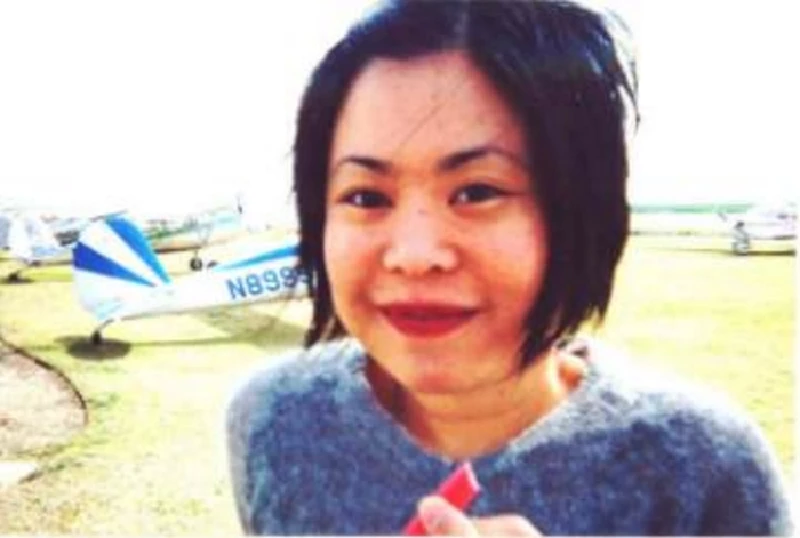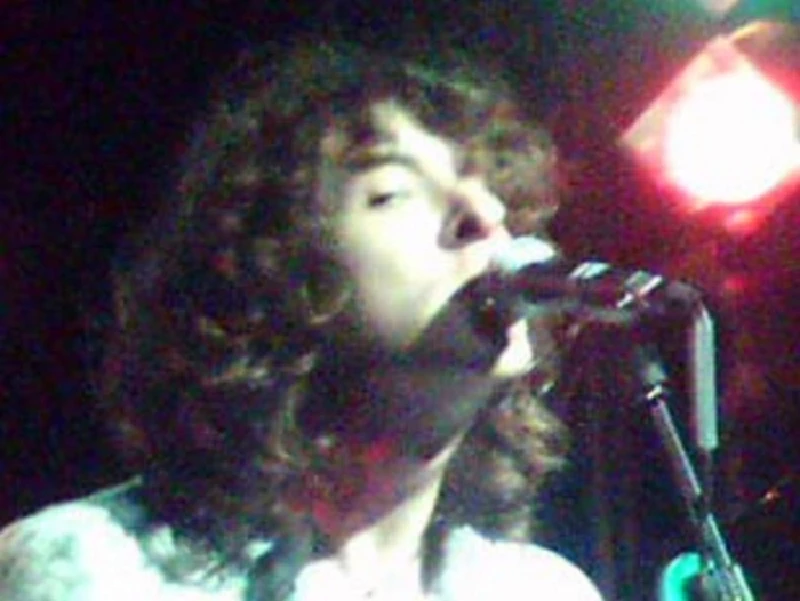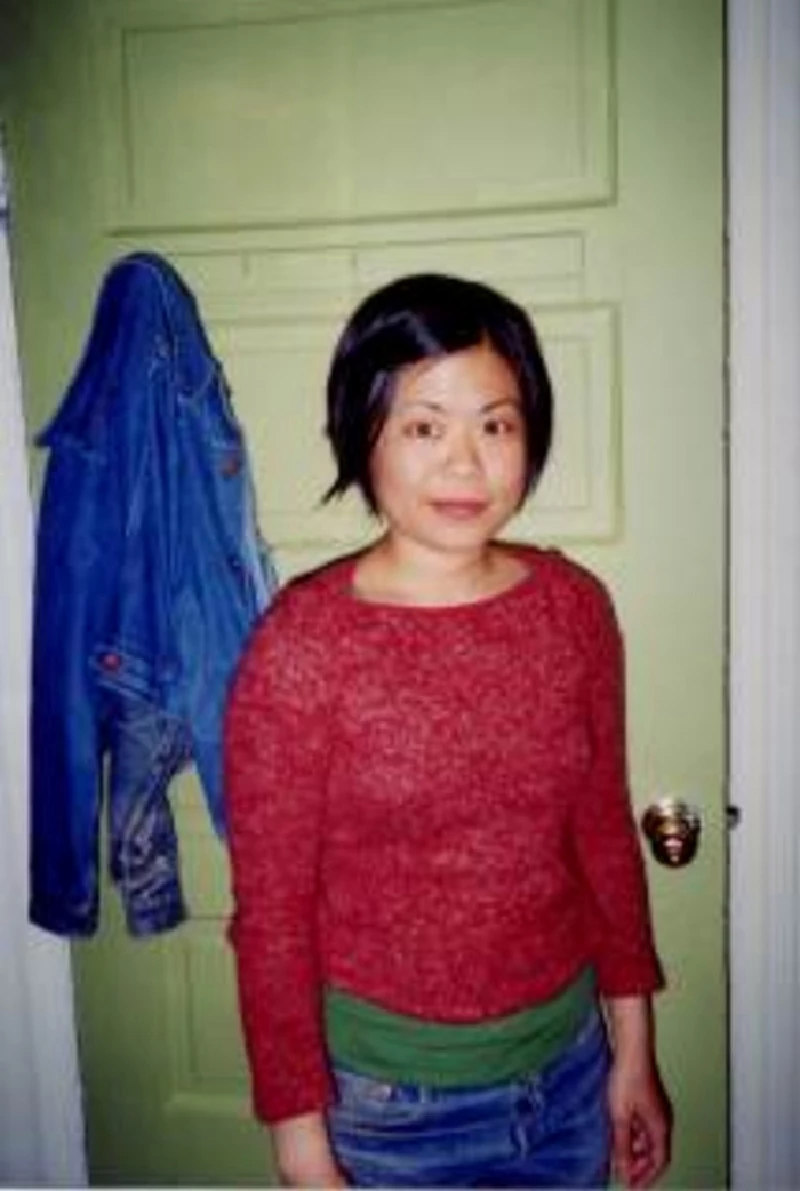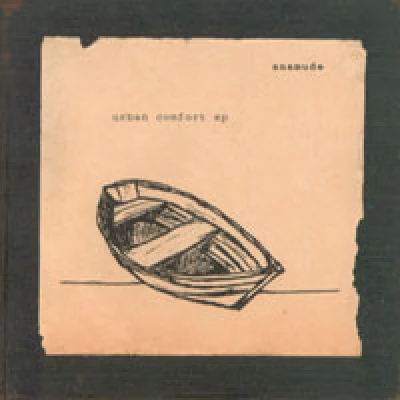anamude - Interview
by John Clarkson
published: 9 / 8 / 2002

intro
Anamude is a San Francisco-based Drama graduate and an aspiring playwright who has now turned to songwriting. John Clarkson speaks to her about her avant-garde indie-folk debut EP, 'Urban Comfort'
Anamude is the nom de plume of Ana Hortillosa, a San Francisco-based Drama graduate and an aspiring playwright, who began playing the guitar and writing songs initially as a hobby. Since playing her first solo gig at the beginning of 2001, Ana has recorded, on 4-track, three albums' worth of material that feature just herself on vocals, her guitar and very occasionally an accordion. Influenced by her own admission as much by William Shakespeare, Samuel Beckett and Flannery O' Connor as by Robert Johnson, John Fahey and the Velvet Underground, she released her debut CD, the six song 'Urban Comfort EP', in June of this year. Limited to 1000 copies, and recorded in a local studio, 'Urban Comfort' merges together soft vocal harmonies and direct sing-speaking from Ana with sparse, but evocative indie-folk guitar work. Bookended by two shorter pieces 'Excerpt' and 'Nosedive, the EP also features a longer track 'Brokedown' and a triad of songs all called 'Urban Comfort', and takes a wry, avant-garde look at the excesses of city living. Ana will be releasing an album on the hinah label next year, and also has other recording plans. In one of her first interviews, Pennyblackmusic spoke to the talented and thoughtful Miss Hortillosa about 'Urban Comfort', literature, the influence of drama on her work and her hopes for the future. PB : You began your artistic career as an aspiring playwright, before switching to music and played the guitar at first as a hobby. Do you see yourself now as a playwright or a musician or both ? Do you continue to write plays as well ? AH : Though I continue to read plays and sketch scenes and dialogue on paper, most of my creative time is in music now. Still, I write and play my songs, knowing that they are informed deeply by elements in theatre, playwriting, and stage- things like narrative and the symbolic effect of objects, gestures, staging, and lighting. I don’t think I would have ever conceived of actually writing songs if I had never explored my love of plays and theatre. The line between writing plays and writing songs is very blurry for me. PB : You have said that the foundations of the 'Urban Comfort EP', and your music in general, are influenced as much by William Shakespeare, Samuel Beckett and Flannery O' Connor as they are by Robert Johnson, John Fahey and the Velvet Underground. In what ways do you see these writers and musicians as having influenced you, and the recordings ? AH : I believe there is a strong literary component in my projects. So, I thought it would be appropriate to reference a range of authors whom I have been drawn to. On and off I thought of Samuel Beckett when I was working on 'Urban Comfort'. I thought of his plays, like 'Waiting for Godot' and 'Happy Days'. And I couldn’t help but remember how the kind of solitary, at times nonsensical, stagnation and waiting of his scenes have resonated with me from time to time. That feeling can come off a sparse stage or at lunch time in the middle of a downtown financial district. Flannery O’Connor is a longtime thread of familiarity to me. I discovered her in high school and her works were one of the reasons I wanted to write at all. It’s too much to flesh through all the ways her works speak to me, but suffice to say, like many writers and playwrights I admire, she can draw you into an entire chain of events by describing a single gesture. Well, and Shakespeare…where do I start…when I first studied Shakespeare, I thought I’d never survive. There were so many names and all these different settings and it wouldn’t necessarily be clear how all these things connected. But all you need is one way in and that world opens up. For me it was usually a single line or a gesture, a missed glance, the repetition of a single word that would go on to epitomize the entire play. I think intuitively these things come out in my music because it’s what I’m drawn to and they have affected my perspective. I discovered the music of Robert Johnson and John Fahey in college and it must have been instant osmosis because afterwards I couldn’t help but approach my guitar in a different way. I know that I began to listen much more carefully and to challenge myself in a different way since then. After a while, I felt my guitar playing to start to become really my own. I still work on it continuously and it feels happily like a never-ending unpredictable road. PB : What about the Velvet Underground. In what ways have they influenced you ?? AH : I grew up in what was a pretty small town at the time with lots of farms surrounding our neighborhood ,and hearing the Velvet Underground for the first time was pretty arresting. I was caught by the kind of city-living that's prevalent in the writings of Lou Reed, and the kinds of personalities he brought out especially. I suppose city-living, the ranges of urban lifestyles have always been an interest for me. Eventually moving to a city myself, I think in my way I add and add to my small catalogue of impressions and concerns, dilemmas and delights that I imagine come out in my projects. Of course, there's the fact that the Velvet Underground just produced great songs...that goes I guess with out saying. For me though, it was what they wrote about and what they observed and experienced and how that came off and affected their songs. PB : J.D. Salinger once advised writers to "write the book you most want to read". In light of this, you have said that the 'Urban Comfort EP' is the beginning of the play that you have most wanted to hear. What did you mean by that ? AH : It’s like having had an idea on the tip of your tongue but never finding the words or the right language to articulate it, much less develop it, or even try to learn from it. Many of the themes I had been tossing and attempting to convey in other ways were just not enough…until I found music as a means to exploring them. The 'Urban Comfort EP 'has expressed some of those themes in a way that I am satisfied with. I interpret Salinger’s words to encourage writers to be, yes, follow your dreams, but involved in that is learning about what you have to say (even if only intuitively) and then what would be the most fulfilling way to say it…and, of course, then do it. I surprised myself with the 'Urban Comfort EP'. I had in the past usually taken my guitar playing and voice for granted, and that has drastically changed in a couple years. In some ways this first EP feels so small compared to how long it feels I’ve been revving up for a project like this…and yet it feels complete and just right the way it is. In this light, the EP is the beginning of what will hopefully be an enduring and fulfilling creative journey. PB : Do you see the songs on 'Urban Comfort' and its central triad in particular as having common themes ? AH : My experience in urban living is that there is always a constant motion. And if you are not moving, sometimes there is a restlessness to move. Even if you stand still, the fact, that everything around you is moving and moving, gives you the impression that you are falling behind. I engage in this lifestyle and often times rebel against it. I know it is a common thing. What is comfort in urban times? Running? Slowing down and being grounded? Remembering where you came from, though that might be painful? Living in amnesia? The triad is for me itself a little three-act of movement and non-movement in an effort to find something comforting--whether that is remembering, forgetting, regretting, standing still, existing, and why why why. The trilogy is a snapshot that encapsulates my impressions of themes in my life and the people around me. PB : The 'Urban Comfort' triad in the middle of the EP seems to be about a metaphysical journey as well . Would you agree with that interpretation ? AH : Yes, I would... PB : Both the trilogy and 'Brokedown', one of the other songs, also seem to be about escaping and reinventing yourself. Do you think that is a fair assessment ? AH : Yes, I think it is. PB : The 'EP took about six months to write and bring together. When you finished it you had a small celebration in which you put up Christmas lights, lit candles and invited your friends over. How did you feel ? AH : Empty…but not in a bad way; Rather, in a satiated way. I felt I had done everything I needed to do at the time, and it was all that I could do. Like I said earlier, I surprised myself with the project. Sometimes you get an idea and you have to go for it before you think about it and come up with all sorts of reasons to put it off. This time, I just did it and when it was “over”, I wasn’t sure I could recognize myself. I had invited some friends to come over to celebrate, but I was in such a weird state that I couldn’t bring myself to announce anything about 'Urban Comfort'. So, we all just hung around and talked about whatever like usual and then they left. But that was all I needed at the time…some familiarity, friends and warmth. PB : Over the course of the last few years you have written three albums worth of material. What do you hope to do with this material ? Do you hope to release it some day ? Do you see the 'Urban Comfort EP' as the best of the material that you have written so far ? AH : Oh yes, I plan to tighten up and release those songs at some point. I have several other songs not on the EP that I enjoy playing a lot. The material for 'Urban Comfort' was the material closest to me at the time and it was a group of songs I was excited to play on my own. Mostly, I thought this group of songs would have the most meaning to me as my first cd. PB : You often play solo gigs with just yourself and your guitar, usually at the Rite Spot in San Francisco. How well have these solo performances gone down with audiences ? Could you ever see yourself working with a band or are you happy continuing to do things on you own? AH : I will be looking for a band at some point. I am interested to see what other musicians will bring to the music, what they will bring out of me, and what kind of music will happen. In the meantime, I think my solo performances have gone over well with audiences. It’s hard to say because I otherwise try not to figure out what an audience is thinking too much during the actual set. Admittedly, I sometimes get shy between songs or I just end up smiling out there and quickly move on to the next song. In any case, I’m enjoying myself and I think it comes off in the set naturally. Afterwards, there are always people asking when I’m playing out next and I manage to sell some cds too. PB : You have got an album coming out on the hinah label early next year. What can we look forward to on that ? AH : I am very excited about this release with hinah. It’s still in the works, but it will have more acoustic songs that have previously been unreleased. PB : What else have you got planned for the near future ? AH : I’m revving up to go back into the studio and to record more songs in anticipation for the release with hinah, but another cd to be released some time next year. I’ll be playing out much much more, and I’ll also have a song coming out on a compilation from Acuarela Discos later this year, the second volume of 'Acuarela Songs' united by a theme of “acuarela” which in English means watercolor. PB : Thank you AH : Thank you
Picture Gallery:-



reviews |
|
Urban Comfort EP (2002) |

|
| Definite case of less being more on acoustic debut release of new San Francisco based singer-songwriter and wordsmith |
most viewed articles
current edition
Carl Ewens - David Bowie 1964 to 1982 On Track: Every Album, Every SongArmory Show - Interview with Richard Jobson
John McKay - Interview
Colin Blunstone - Thalia Hall, Chicago, 16/7/2025
Billie Eilish - O2 Arena, London, 10/7/2025
Bathers - Photoscapes 1
Visor Fest - Valencia, Spain, 26/9/2025...27/9/2025
Loft - Interview
Sir Tim Rice - Interview
Robert Forster - Interview
previous editions
Manic Street Preachers - (Gig of a Lifetime) Millennium Stadium, Cardiff, December 1999Heavenly - P.U.N.K. Girl EP
Beautiful South - Ten Songs That Made Me Love...
Oasis - Oasis, Earl's Court, London, 1995
Peter Perrett - In Dreams Begin Responsibilities Interview Part One
Boomtown Rats - Ten Songs That Made Me Love....
Coldplay - Wembley Arena. London, 16/8/2022
Prolapse - Interview
Pixies - Ten Songs That Made Me Love...
Trudie Myerscough-Harris - Interview
most viewed reviews
current edition
Davey Woodward - Mumbo in the JumboSick Man of Europe - The Sick Man of Europe
Lucy Spraggan - Other Sides of the Moon
Amy Macdonald - Is This What You've Been Waiting For?
Phew, Erika Kobayashi,, Dieter Moebius - Radium Girls
Bush - I Beat Loneliness
Suzanne Vega - Flying With Angels
Alice Cooper - The Revenge of Alice Cooper
Cynthia Erivo - I Forgive You
Blueboy - 2
Pennyblackmusic Regular Contributors
Adrian Janes
Amanda J. Window
Andrew Twambley
Anthony Dhanendran
Benjamin Howarth
Cila Warncke
Daniel Cressey
Darren Aston
Dastardly
Dave Goodwin
Denzil Watson
Dominic B. Simpson
Eoghan Lyng
Fiona Hutchings
Harry Sherriff
Helen Tipping
Jamie Rowland
John Clarkson
Julie Cruickshank
Kimberly Bright
Lisa Torem
Maarten Schiethart